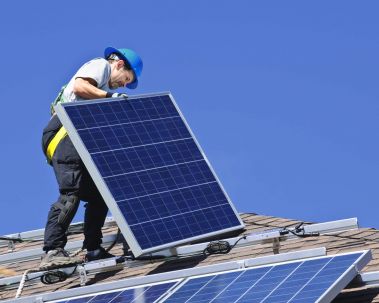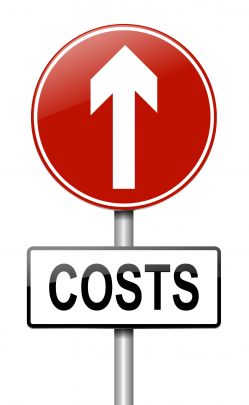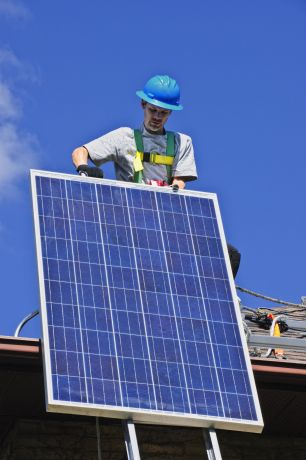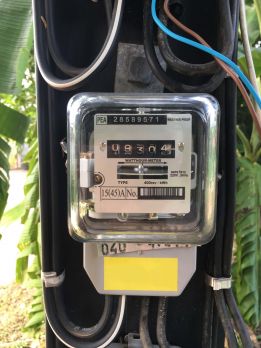Installing Solar Panels on Roof Cost New Jersey | Solar Panel Installation Costs
Installing solar panel systems on roof cost
How much it cost to install a solar panel also depends on the type and size of your roof and how quickly you want the system installed. A large, south-facing rooftop with an unshaded area is ideal for a solar installation. This will reduce construction time and increase energy production. It’s important to note that not all roofs are designed to be solar installations. If your roof is too small, not correctly oriented, or shaded by trees and buildings, it may not be a good fit for solar PV panels.
It’s also important to note the difference between installed solar panels cost and solar power cost. To install a solar array on your roof is just one part of a complete solar power system. Other costs include an inverter, installation labor, permits, equipment mounting hardware, wiring, electrical components (like conduit or junction boxes), and other miscellaneous components.
There are two types of solar power system available for homeowners.

Grid-tied systems
Grid-tied systems are usually the best option for homeowners. With this system, you’re selling power back to your supplier and they credit you for any additional energy that’s produced beyond what you use in your house. If there is no grid nearby, an off-grid system may make sense. This would be a good fit for remote cabins or homes off the electrical grid.
Off-grid systems
Systems that are off the grid are not dependent on a utility. Batteries store power for use at night. Off-grid systems are generally more expensive than grid-connected ones.
It’s important to note that you’re most likely going to want a battery storage system in place with an off-grid installation.
Hybrid Systems
A solar electric panel and a battery are combined in the hybrid system. The electricity created by the panels is stored in batteries, allowing it to be used even when there isn’t any sunshine. When you need power, the batteries store energy generated by the solar panels and distribute it as required.
The hybrid system is typically utilized in tiny buildings that rely entirely on the photovoltaic energy. It can also be used as a stand-alone power supply to smooth out the variations in solar energy production throughout the day or store some surplus for later use in more significant buildings.
Solar Panel Cost per kW

The size of the system is another constant when considering how much it will cost to install solar panels on a roof. The larger your home is, the more power you will need for your system to be cost-effective. Systems can range from 3kW, which provides enough electricity for a small household, up to 10-20kW, power a large home, and even an electric car.
Depending on where you live, the cost of installation per kW can range from $9,255 – $28,000. The installation cost of a solar panel will generally fall somewhere in this range, and it is essential to remember that these prices do not include tax credits, net metering, and other incentives.
Large utility companies will offer an approved leasing program that lets people lease solar panels for a monthly fee in some areas. In this case, the leasing company will install solar panels at no cost to you and bill you for any energy they generate from your rooftop solar system and for maintenance over the term of the contract.
Solar Panel Costs Breakdown
As mentioned above, the installation cost depends on how much power you need and your home size. It also depends on your location. Different factors determine the final price of solar panels for homeowners in other areas. These include:
- Labor Costs: This is the most significant component of solar installation cost. The average cost of labor for installation is $0.59 per Watt. Installation cost vary depending on such things as the weather,solar panel output, and soft expenses.
- Materials Costs: Solar panels are composed of several different materials. While any significant cost variation in this area is unlikely, it is essential to be aware that some companies may inflate their prices to increase profits.
- Permit/Inspection Fees: Depending on the location, you may be required to pay permit/inspection fees. These can range from $450-$500 for residential and $1k for commercial. Several other fees will change how much it costs to install solar panels, including grid connection fees, transmission interconnection tariffs, and specific utility company surcharges.
- Inverters Costs: Most grid-tied systems require an inverter. These are generally between $1000 to $1500, depending on the size of your system and inverter type.
- Mounting Costs: Mounting costs include racks, foundations, and other parts used to secure solar panels. These can range from $0-$1/watt. In addition to the main components of solar panel installation, many other pieces may be included depending on your system type, including cable wiring and disconnects.
- Panel Costs: The final significant cost is the solar panels themselves. These can range from $2/watt to $3/watt, with larger and less efficient panels costing more.
Factors That Influence Solar Panels Cost
The installation size, how many solar panels are being installed, and what type of roof your house has will all influence how much it costs to install solar panels. In addition, an installer might charge a fee for additional work like wiring or permits. One of the most crucial factors in determining solar panel cost is local weather patterns.
A city with high levels of sunlight or more substantial sun angles will mean the solar PV panels can capture solar energy more efficiently, so fewer panels will be needed for your system to work.
Several other factors can influence solar panel costs. These include:

Your location
The installation cost varies by location and is often determined by state, county, or city regulations. Generally speaking, southern states where sunlight hours are more plentiful tend to have lower costs.
Home Size
Home size determines the amount of electric power you need to make the installation worthwhile. This will affect how many solar panels are required, which can increase costs significantly.
Size of System
There are many different types of solar panel systems, including grid-tied, off-grid, and hybrid systems. Grid-tied is by far the most common, but off-grid and hybrid systems are becoming more popular. The size of the system will largely determine the final cost of solar panel installation.
New Jersey Solar Incentives
Solar incentives are another essential factor when determining overall costs. Some states offer tax credits, while others like New Jersey provide subsidies for solar panel system installation or the installation of energy-efficient appliances. There are also federal tax credits to consider, which can decrease your final price by up to 26%. Other types of rebates may exist in your area, which you should take advantage of if possible.
With NJ rooftop solar installation, there are also property tax credits that you can apply for. The state government looks at the value of your house before applying, so if you’ve recently had any improvements done, it may be worth looking into!
Typically, a homeowner who chooses solar power will receive a decrease in their property taxes. This is because solar energy systems are typically considered an improvement to property value. However, some areas will not allow for this property tax reduction if the home has already received financial assistance for the system or if it is still paying off the solar panel system.
Solar installation costs
Several factors determine how much it will cost to install your solar panels, including location, government incentives, labor costs, etc. These can each play their role in determining the price of your solar panel installation.
How many solar PV panels to power a house?

To cover 100 percent of a home’s electricity needs, you’ll need around 20 to 25 solar panels. The actual number of solar panels you’ll require will be determined by a variety of circumstances, including geographic location, panel efficiency, panel rated power, and your personal energy consumption habits.
Installing solar on your roof is a significant investment. Before you start comparing prices and installation costs, here are five things to keep in mind:
1. A solar installation is designed to last 25 years or more. It’s important to factor in your upfront cost against your long-term savings.
2. The size of the solar installation you need is dependent on the power your household consumes. It’s up to you to determine whether a battery backup system might be necessary and how much that will add to your solar installation cost.
3. You don’t have to install solar panels yourself. Instead, let professionals handle it for you. Make sure you get a reasonable price for installation labor and include that in your final cost.
4. Solar panels can be installed on the roofing of any shape and size, but this might impact the number of solar panels necessary to meet your energy needs. You may need more or fewer solar panels than another home by having a larger or smaller roof.
5. In most areas of the United States, you’ll be eligible for one or more tax credits when you install a home solar system. Government subsidies will vary from one state to another and may change over time.
If you’re looking for a company to install a solar renewable energy system, talk to a local installer or provider for an estimate because the cost can vary based on numerous criteria, such as the size of your custom system and where you reside.
How are solar panels installed?
Solar panels are typically installed on the roof of a home or business. The panels face south and are angled to capture the most sunlight possible. They are connected to the home’s electrical system, and the power they produce is used to offset electricity costs.
Some people choose to install them in their backyard. This can be a good option if you have enough space for them. The panels can be mounted to a fence or wall, and they will face the most efficient direction based on the sun’s position in the sky.
No matter where you install your solar panels, it’s important to make sure they are in a sunny spot and that they receive proper ventilation. If they are covered in snow or debris, they will not be able to produce energy. Make sure to keep the panels clean and free of any obstructions.
If you’re not comfortable installing the panels yourself, you can hire a contractor to do the work. However, it is good to know how they are installed because you might need to remove or move them at some point in the future.
Is it worth it to install solar panels?
The best way to determine if it is worth installing solar modules in your home is to look at your utility bill and receive quotes from different companies. While the price can vary, you can expect benefits when installing solar panels, such as increased property value, hedging against future utility rate increases, and reduced environmental impact.
Here are the steps you can take to see whether solar panels will save you money.
Review your electric bill
The first step to determining whether solar panels will save you money is to review your electric bill. Note how much power is being used during peak and non-peak times and the per kWh rate you charge for this electricity.
Evaluate your sunlight exposure
The amount of sunlight you receive can drastically affect the performance of your panels. This is a significant factor when determining the best solar panel installation method for your needs.
Estimate residential solar panels cost
When it comes to figuring out how solar panels work and how much do solar panels cost, several different factors must be considered. The most significant factor influencing the price of solar panels is how much sunlight you receive and where your home is located. This can affect the installation cost and what type of solar energy system should be installed (solar panels, solar water heating, etc.).
Depending on these factors, you should get a general price range for installing solar panels. However, this may require multiple visits to your home by different companies to factor in all necessary components. Simply looking at quotes is not enough because each company will have implemented its strategies for coupons, rebates, and other incentives, which can significantly affect the final price. While this may make things more complex, it is also your best way to save money when installing a solar array.
Look for incentives
There are several different incentives available for homeowners who install solar panels on their property. Some of these are local like in Nj, while others may be offered by the state or federal government. It is essential to take advantage of any government incentives available because they can significantly reduce your system’s final cost, allowing you to get more out of your investment.
Keep an eye on trade policy
As new trade policies are developed, it may become increasingly difficult to find the same level of incentives for solar installation. This is important because incentives can make up a large portion of your initial cost when determining how much you will spend on solar panel installation. If this becomes an issue in your area, you may want to consider installing smaller panels allowing additional power if any of your local incentives are removed.
Consider leasing panels
Leasing solar panels can be an excellent way for homeowners who do not want to pay an upfront cost to get into this particular industry. Leasing companies will compensate you for using the equipment and installation while also maintaining all aspects of the system, allowing you to enjoy the benefits without making a significant investment.
Pros and cons of having solar energy system on your roof
The main benefit of having solar panels installed on your home is generating your electricity while also saving money on your monthly utility bills. However, there are other benefits, such as reduced environmental impact and increased property value.
Pros of Installing Solar Panels In Your Roof
One of the main benefits of installing solar panels on your roof is that you will get to generate your electricity. Many homeowners have been hesitant to go solar because of its high cost, but new leasing options have made this a more common practice.
Another benefit to having a home installation of solar panels is that you can deduct 26 percent of the installation cost from your income taxes. This makes it an effortless way to save even more money on solar panel installation.
Another positive aspect of going solar is that reducing your carbon footprint will significantly impact the environment. This benefit goes far beyond just your home since climate change has the potential to affect every area of human life.
Cons of Installing Solar Panels In Your Roof
The most significant issue with solar panel installation can be pretty expensive. Your solar system will require a considerable investment to get started. While there are specific policies to lower the cost of your solar module, most of these benefits will be passed on to large corporations rather than homeowners who are already struggling to make ends meet.
Another issue with going solar is that you still have to be connected to the power grid if your panels do not produce enough electricity for your needs. This can lead to many issues, including high costs due to excess use and the inability to sell any extra power back for money.
How do you pay for a solar panel installation?
There are options for paying for a solar panel system that you own outright: an upfront, cash payment, or a solar loan. The best way to make the most of your solar savings is to buy a solar panel system with cash. But if you need financing, there are several loan options to choose from.
Solar loans allow you to have your solar panels installed now, and pay for them over time at a fixed rate. You could also choose a solar lease, which allows you to pay a monthly fee in exchange for using the solar panels installed on your property.
With a solar loan, you’ll own the system from day one and will save the most money in the long run. A solar lease, on the other hand, can be a good option if you don’t have the cash to buy a system outright and you want to start saving money right away.
The best way to decide which option is right for you is to do some research and compare your options. There are many lenders and leasing companies that offer solar loans and leases, so it’s important to find the one that best meets your needs.
